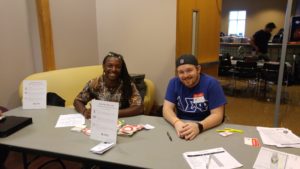
Members of the Delta Sigma Phi fraternity sponsor the blood drives each semester at WCU. Pictured are DJ Williams and Chandler Tyburski. Photo by Brandon Key.
Hurricane Katrina devastated the United States in the summer of 2005, resulting in billions of dollars in damages and over a thousand casualties. Because of the tremendous damage the storm caused and the amount of lives affected, the American Red Cross needed all the help it could get in the aftermath of the storm.
As a result, the American Red Cross became the philanthropy and service partner of the Delta Sigma Phi fraternity and have since worked together on numerous projects, notably on blood drives.
Last week, almost 12 years later, the Delta Sigma Phi chapter at Western Carolina University sponsored another blood drive, raising over 200 units of blood.
Every school year since 2005, the Delta Sigma phi fraternity has sponsored two blood drives every semester and have helped raise thousands of units of blood.
According to the American Red Cross, donating blood can save, on average, three lives, and someone in the U.S. needs blood every 2 seconds.
“It is important to donate because when you donate blood, you are able to save lives. This could be your best friend, family or someone you’ve never met before, but you are able to save them every time you donate,” explained Chandler Tyburski, blood drive coordinator for WCU and member of Delta Sigma Phi.
An estimated 38 percent of the U.S. population is eligible to donate blood at any given time. However, less than 10 percent of that eligible population actually donates each year.
Potential donors read a series of handouts, followed by a short physical examination and questionnaire. Not every donor that wants to donate blood is able to do so. Potential candidates must pass a short physical examination that includes checking blood pressure, iron levels and medical history. Several donors were unable to give due to low iron levels, but anyone who was unable to give is encouraged to keep trying.
“I’ve actually tried to donate three times, but my iron level was a tiny bit too low each time. While being declined is discouraging, it’s important to keep trying because most people don’t donate or even attempt to,” said Julia Lamb, a WCU student who was unable to give during the blood drive.
After giving blood, the donors could ask any questions they may have and were instructed how to care for themselves following the donation.
Blood is then processed, tested for diseases, stored until it is needed and then shipped out to hospitals that need it.
While collecting 200 units of blood is an accomplishment, the Delta Sigma Phi fraternity is looking for ways to get more people donate blood, given the convenient location on WCU’s campus and a large student body.
“Our goal for this blood drive was 250 units of blood. We didn’t meet that, and our next goal is the same: 250,” explained Zack Mense, assistant WCU blood drive coordinator. “We will work to spread the word when the next blood drive is here. We want to pair up with the Red Cross club to help on campus and contact the local radio station as well.”
The next blood drive will be in April.



